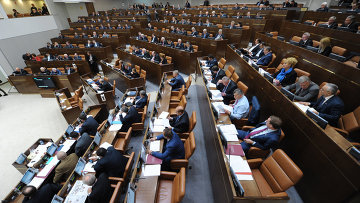MOSCOW, December 26 – RAPSI. The upper house of Russia’s parliament, the Federation Council, unanimously passed the controversial bill which prohibits U.S. citizens from adopting children in Russia.
All 143 members of the Federation Council present voted to support the bill.
It is named after Dima Yakovlev, a two-year-old boy who died in the US after his foster father left him in a locked car in the sun. The ruling United Russia party members said that the bill commemorates all Russian children who died or suffered as a result of negligence on the part of their U.S. foster parents.
The bill includes measures against U.S. citizens who violated the rights of Russians, committed crimes against them, or were involved in these types of crimes. The document also envisages the drafting of a list of U.S. citizens who will be prohibited from entering Russia, and will suspend the activity of any legal entities controlled by these individuals in the country.
The Dima Yakovlev law was passed in retaliation for the US Magnitsky Act, stipulating visa sanctions for Russians who are believed by the senate members to have been involved in human rights violations. The law evoked severe criticism from the Russian lawmakers.The Russian public has been largely supportive of the bill, with 56 percent of respondents in an opinion poll conducted by the Public Opinion Foundation (FOM) saying they backed a ban on US nationals adopting Russian children.
Opponents of the bill accuse MPs of using orphans as political pawns, and the opposition newspaper Novaya Gazeta has collected over 100,000 signatures in an online petition against the ban. The head of the Kremlin's council on human rights said last week that he supported the ban, but also called for a reform of the adoption system to allow Russians to more easily adopt Russian children.
Russia's Foreign Ministry denied on Wednesday US allegations that the law would be in violation of the 1989 UN convention on child rights.
Children's Rights Commissioner Pavel Astakhov declared that Russia's willingness to ban US adoptions of its children are in line with its obligations under international law.
"Russia will not violate any international legal standards by withdrawing from the agreement unilaterally... According to the UN Convention, the state is obligated to do all it can for children living in foster families, and, first and foremost, must protect their rights. And we can see that children handed over to the United States are not protected," Astakhov said.



